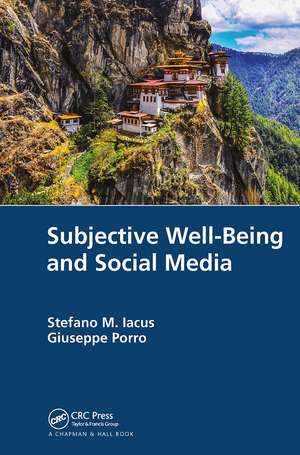Subjective Well-Being and Social Media
Autor Stefano M. Iacus, Giuseppe Porroen Limba Engleză Paperback – 25 sep 2023
The book also explains in full details how to solve the problem of selection bias coming from social media data. Mixing textual analysis, machine learning and time series analysis, the book also shows how to extract both the structural and the temporary components of subjective well-being.
Cross-country analysis confirms that well-being is a complex phenomenon that is governed by macroeconomic and health factors, ageing, temporary shocks and cultural and psychological aspects. As an example, the last part of the book focuses on the impact of the prolonged stress due to the COVID-19 pandemic on subjective well-being in both Japan and Italy. Through a data science approach, the results show that a consistent and persistent drop occurred throughout 2020 in the overall level of well-being in both countries.
The methodology presented in this book:
- enables social scientists and policy makers to know what people think about the quality of their own life, minimizing the bias induced by the interaction between the researcher and the observed individuals;
- being language-free, it allows for comparing the well-being perceived in different linguistic and socio-cultural contexts, disentangling differences due to objective events and life conditions from dissimilarities related to social norms or language specificities;
- provides a solution to the problem of selection bias in social media data through a systematic approach based on time-space small area estimation models.
Stefano M. Iacus is full professor of Statistics at the University of Milan, on leave at the Joint Research Centre of the European Commission. Former R-core member (1999-2017) and R Foundation Member.
Giuseppe Porro is full professor of Economic Policy at the University of Insubria.
An earlier version of this project was awarded the Italian Institute of Statistics-Google prize for "official statistics and big data".
| Toate formatele și edițiile | Preț | Express |
|---|---|---|
| Paperback (1) | 341.46 lei 6-8 săpt. | |
| CRC Press – 25 sep 2023 | 341.46 lei 6-8 săpt. | |
| Hardback (1) | 578.55 lei 3-5 săpt. | +21.56 lei 7-13 zile |
| CRC Press – 5 aug 2021 | 578.55 lei 3-5 săpt. | +21.56 lei 7-13 zile |
Preț: 341.46 lei
Preț vechi: 447.07 lei
-24% Nou
Puncte Express: 512
Preț estimativ în valută:
65.34€ • 67.41$ • 54.53£
65.34€ • 67.41$ • 54.53£
Carte tipărită la comandă
Livrare economică 26 martie-09 aprilie
Preluare comenzi: 021 569.72.76
Specificații
ISBN-13: 9781032043166
ISBN-10: 1032043164
Pagini: 220
Dimensiuni: 156 x 234 x 14 mm
Greutate: 0.45 kg
Ediția:1
Editura: CRC Press
Colecția Chapman and Hall/CRC
ISBN-10: 1032043164
Pagini: 220
Dimensiuni: 156 x 234 x 14 mm
Greutate: 0.45 kg
Ediția:1
Editura: CRC Press
Colecția Chapman and Hall/CRC
Cuprins
1. Subjective and Social Well-being. 2. Text and Sentiment Analysis. 3. Extracting Subjective Well-Being from Textual Data. 4. How to Control for Bias in Social Media. 5. Subjective Well-Being and the COVID- Pandemic.
Notă biografică
Stefano M. Iacus is full professor of Statistics at the University of Milan, on leave at the Joint Research Centre of the European Commission. Former R-core member (1999-2017) and R Foundation Member.
Giuseppe Porro is full professor of Economic Policy at the University of Insubria.
An earlier version of this project was awarded the Italian Institute of Statistics-Google prize for "official statistics and big data".
Giuseppe Porro is full professor of Economic Policy at the University of Insubria.
An earlier version of this project was awarded the Italian Institute of Statistics-Google prize for "official statistics and big data".
Recenzii
"Besides considering the problem of well-being estimation per se, the book presents a great compendium of methods helpful for students and specialists working on various projects which need getting big data from the net sources for statistical research in social studies."
-Stan Lipovetsky in Technometrics, October 2021
"[...] the authors present a detailed introduction to the concept of subjective well-being, citing the work both of psychologists and economists. An account of the methods used to measure subjective well-being, and in particular those relevant to social network data is given, making this work of interest to a wide range of researchers and advanced students, including economists, psychologists, statisticians and data scientists. An exposition of the technical issues involved in text and sentiment analysis, as well as a thorough account of existing techniques and methodologies, provides the necessary background for those new to this area. ... Closely referenced and clearly written, researcher’s and advanced students in all related fields, will find this a useful, informative and eminently readable book."
- Dawn Holmes in Journal of the Royal Statistical Society, Series A, June 2022
-Stan Lipovetsky in Technometrics, October 2021
"[...] the authors present a detailed introduction to the concept of subjective well-being, citing the work both of psychologists and economists. An account of the methods used to measure subjective well-being, and in particular those relevant to social network data is given, making this work of interest to a wide range of researchers and advanced students, including economists, psychologists, statisticians and data scientists. An exposition of the technical issues involved in text and sentiment analysis, as well as a thorough account of existing techniques and methodologies, provides the necessary background for those new to this area. ... Closely referenced and clearly written, researcher’s and advanced students in all related fields, will find this a useful, informative and eminently readable book."
- Dawn Holmes in Journal of the Royal Statistical Society, Series A, June 2022
Descriere
The authors describe a social media index for measuring subjective well-being, relying on the availability of big data sources provided by the social networking sites, and on one of the most recent techniques for sentiment analysis. This approach disentangles the main methodological issues raised in the literature on well-being measurement.
